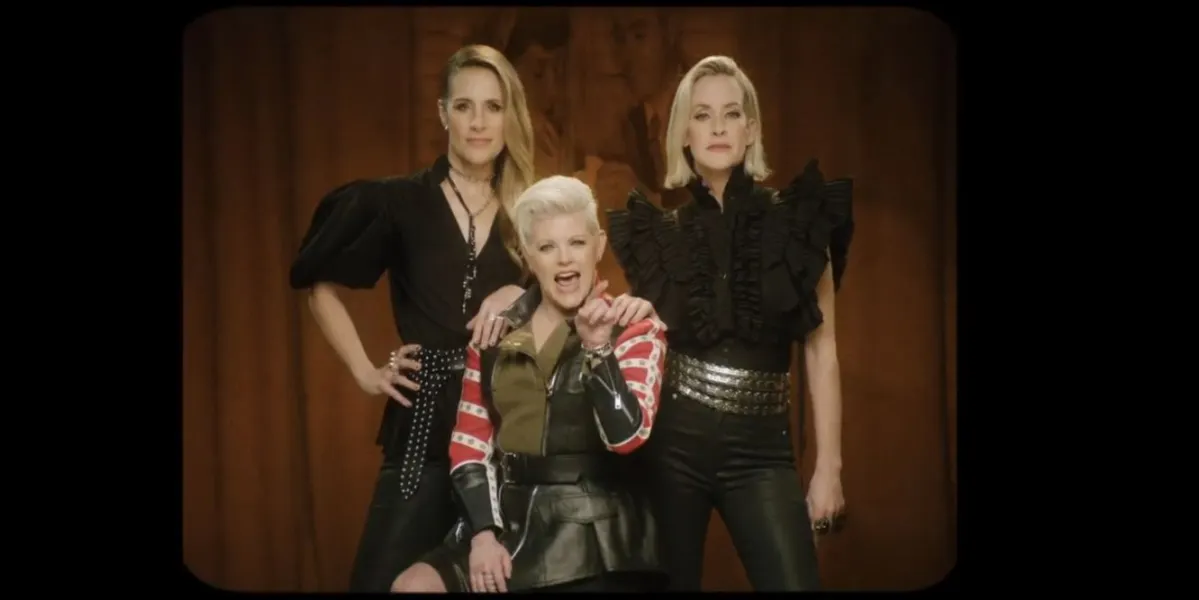Country music trio the Dixie Chicks are changing their name to simply The Chicks. The band announced their new name via their latest music video “March March,” which features footage of the George Floyd protests, as well as other current and historical protests for climate change, gun reform, gay rights, and more. All of their social media handles have since been changed to reflect the new name.
The band stated simply, “We want to meet this moment.” The band also acknowledged New Zealand group The Chicks, adding “A sincere and heartfelt thank you goes out to ‘The Chicks’ of NZ for their gracious gesture in allowing us to share their name. We are honored to co-exist together in the world with these exceptionally talented sisters. Chicks Rock!”
The band was originally a reference to “Dixie Chicken,” a 1973 album by the country group Little Feat.
Natalie Maines, Emily Strayer, and Martie Maguire have long been a lone liberal voice in the world of country music, dating back to 2003 when they criticized then-President George W. Bush over invading Iraq during a concert. The band was boycotted, their music was blacklisted from country stations, and the Chicks received death threats as a result.
The name change is yet another outcome of the sweeping Black Lives Matter movement that has spread worldwide after the murder of George Floyd at the hands of the police. His death and the ongoing rampant police brutality has kick-started an international reckoning on racial justice. In only a month, it’s become a long-overdue cultural sea change that has extended from politics to corporate mascots to sports to popular culture to Confederate monuments.
Fellow country band Lady Antebellum had previously announced that they were changing their name to Lady A. Jeremy Helligar wrote a guest column in Variety titled “After Lady Antebellum, Is It Time for the Dixie Chicks to Rethink Their Name?” In it, he discusses the history of the word “dixie” and its connections to the confederacy.
“‘Dixie,’ for the record, is the epitome of white America, a celebration of a Southern tradition that is indivisible from Black slaves and those grand plantations where they were forced to toil for free. The origin of the word, though, is unclear. One theory links it to Jeremiah Dixon, who along with Charles Mason, drew the Mason-Dixon line as the border between four states that later became the unofficial separation between free states and slaves states. Other less likely theories trace it back to a slave owner from Manhattan as well as “dix,” a word written on Louisiana’s 10-dollar bills pre-Civil War that’s French for ‘ten.’ Regardless of its origin, for many Black people, it conjures a time and a place of bondage.”
Many took to Twitter to celebrate The Chicks’ new name:
I’ve loved The Chicks’ music my entire life. As a Texan, I absolutely agreed with Natalie Maines when she criticized George W. Bush.
Good riddance to their former name, and looking forward to seeing them for the sixth time when they next tour! https://t.co/9D7cCVlT5k
— Guthrie Graves-Fitzsimmons (@GuthrieGF) June 25, 2020
I love it!!! Huge fan of The Chicks and proud they’re Texans. ❤️ https://t.co/vr7D6NMFDJ
— Charlotte Clymer 🏳️🌈 (@cmclymer) June 25, 2020
We owe The Dixie Chicks everything after the bullshit we put them through in the 2000s. They get to do whatever the fuck they want
— Joseph Longo (@josephlongo_) June 25, 2020
I know The Chicks got some interest from liberals after they were viciously attacked for criticizing W. Bush. But truly, they are a good band aside from that, and had progressive and anti-war leanings even before. So this really is the definition of overdue.
— Amanda Marcotte (@AmandaMarcotte) June 25, 2020
I thought the Dixie Chicks were just fans of Designing Women all this time
— Ira Madison III (@ira) June 25, 2020
Confederate references are being stripped away, from statues to schools to Splash Mountain to The Dixie Chicks. If that makes you mad, maybe it was a bad idea to attach your cultural identity to 150 year old racist traitors who lasted 5 years before getting their asses kicked?
— Rob Sheridan #BLM #ArtIsResistance (@rob_sheridan) June 25, 2020
(via Pitchfork, image: The Chicks)
Want more stories like this? Become a subscriber and support the site!
—The Mary Sue has a strict comment policy that forbids, but is not limited to, personal insults toward anyone, hate speech, and trolling.—










Published: Jun 25, 2020 02:34 pm